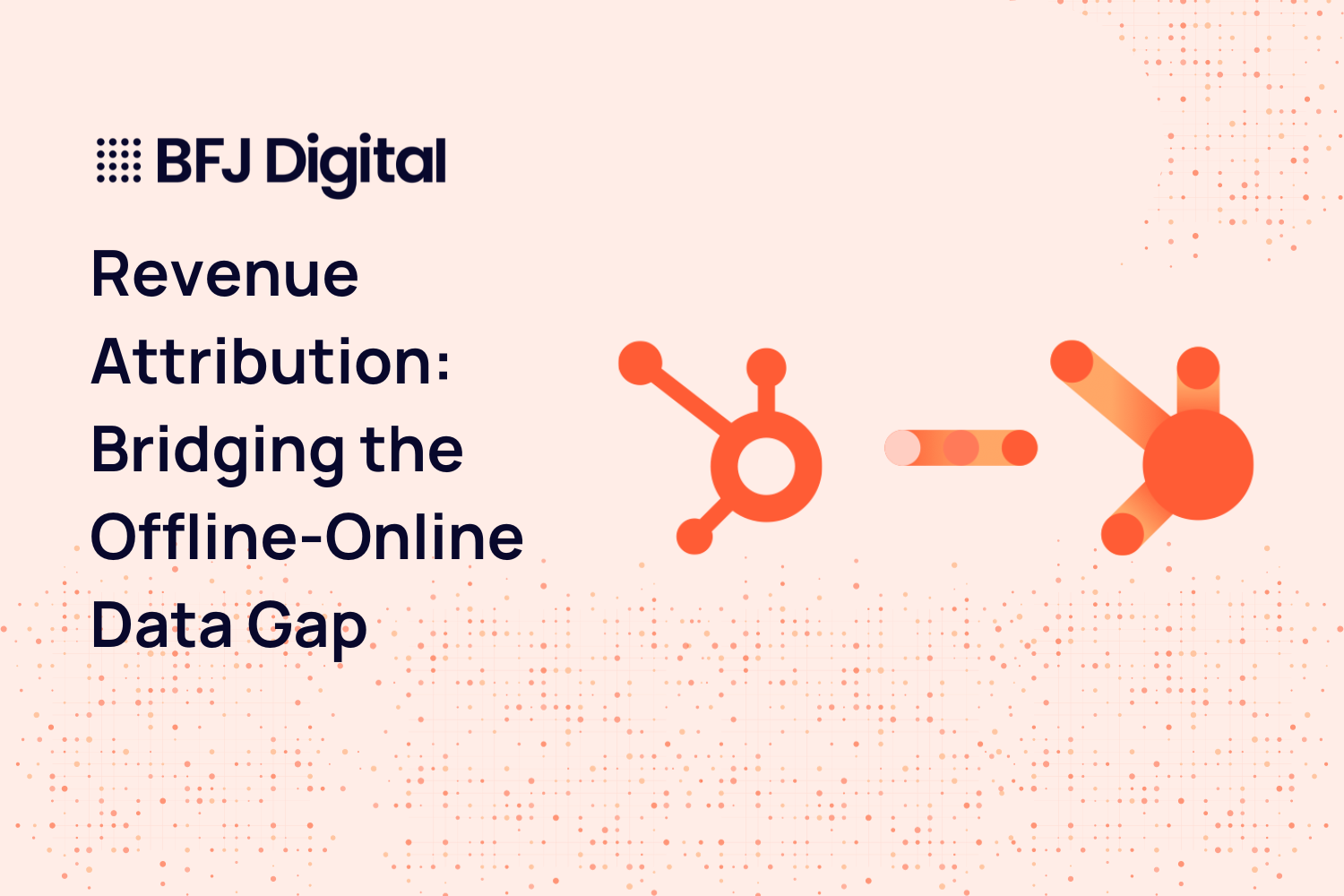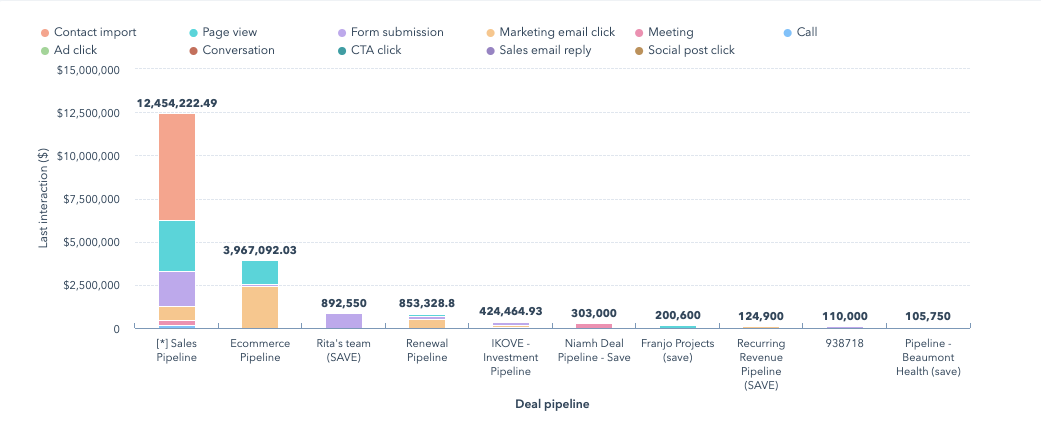Offline Revenue Attribution - Bridging the Offline-Online Data Gap

Table of Contents
Table of Contents
If you need a customised CRM system, contact our team today.
Understanding and justifying your funding sources is paramount in creating the most effective marketing efforts. In this blog, we’ll delve deeper into the revenue attribution, uncovering the details that drive marketing efforts into tangible results
In today’s marketplace, the many facets of the customer journey are at the forefront of offline marketing challenges. Customers interact with brands at multiple touchpoints (online marketing campaigns & in store) which makes it more difficult to track appropriate marketing strategies & attribute their respective sales. Offline revenue attribution presents itself as a solution to get a holistic view of the sales pipeline.
- The Challenges of Offline Marketing Attribution
- Leveraging CRM Integrations for Effective Offline Marketing Attribution
- BFJ: Harnessing the Power of CRM Integration for Comprehensive Offline Marketing Attribution
The Challenges of Offline Marketing Attribution
Given the importance of offline revenue attribution, it is equally important to understand that it presents unique challenges. Understanding the impact of offline channels on sales in terms of marketing success is important, but unfortunately, it is an approach that has its own challenges these challenges are:
- Managing Customer Interactions: Initially, offline revenue attribution is being able to track how your customers interact with offline channels. Unlike E-commerce stores where every click and action in tracking a customer journey is accessible, online interactions such as store visits and phone calls, are inherently more difficult to quantify That lack of analysis this makes it difficult to associate transactions with sales in marketing contexts.
- Integration of offline and online data: Most businesses operate online and offline, requiring seamless integration of data from any source The challenge of building an integrated platform to track customer journeys using online and offline data can hinder data-driven decisions It is important to estimate the revenue stream.
- Choosing the Right Attribution Model: There are many different attribution models to choose from, and choosing the most appropriate one for your offline channel can make or break its efforts Each model offers a different way of assigning value to each touchpoint on customer journey for. The hard part of the decision is choosing a model that accurately reflects the impact of your business’ online interactions on the final purchase.
- Adapting to changes in consumer behaviour: As marketers, we understand that the nature of consumer behavior is highly dynamic and constantly changing. The challenge here is that you can always optimise your attribution strategies. Being able to keep up with the changes is important in collecting and reporting accurate revenue characteristics.
Alongside these challenges come opportunities. When companies can control these issues, they are able to unlock the true potential of their marketing efforts across all channels.

Book a free strategy session today
Book a free session to elevate your online performance. Save time and costs with our comprehensive, streamlined approach.
- Meet with a strategy specialist to build a growth plan.
- Increase your media performance by up to 200%
- Improve business efficiencies to increase ROI via automation and increase profit
- We cut to the chase. What digital marketing is actually working?
Table of Contents
If you need a customised CRM system, contact our team today.
Leveraging CRM Integrations for Effective Offline Marketing Attribution
We use our CRM solutions to help address all of these issues by increasing offline revenue attribution. Here we will focus on the potential of HubSpot as a leading CRM platform.
- Revenue generating deal tracking: Trend reporting by HubSpot helps track the many deals that generate revenue. This report covers all the interactions that take place online and offline on a user’s journey.
- Detailed deal tracking: HubSpot’s feature reporting allows for tracing of deals leading to contact rooms, contract execution, and revenue. This provides a comprehensive view of the customer journey, with online and offline interactions so included. For offline marketing, this means that revenue can be generated from interactions such as calls, meetings, and in-person events.
- Customizable Attribution Model: Several attribution models are provided by HubSpot for its users which distribute credit to interactions across a customer’s journey. The models range from basic first or last interaction models to a more complex range of linear, U-shaped, W-shaped, time decay, full path. It is important to choose the most suitable model so as to have accurate distribution of offline sales into different marketing efforts.
- Enhanced Lead & Deal Tracking: Among other things, HubSpot has a feature where it can track leads and deals occurring within the sales pipeline. Additionally, it tracks lead progression generated via offline channels which helps in understanding how they contribute to this process in detail.
- Optimising Marketing Strategies: Businesses can use this data to optimise their marketing strategies through Hubspot’s advanced revenue attribution reporting. HubSpot’s offline revenue attribution features help in understanding which offline channel is the most effective. This will enable businesses make data-driven decisions, allocate resources efficiently and tailor their campaigns to maximize ROI.
BFJ: Harnessing the Power of CRM Integration for Comprehensive Offline Marketing Attribution
At BFJ Digital, we value our reporting and transparency with our clients so we can make the best data-driven decisions possible. Using advanced reporting methodology through BFJ custom data warehouses, we can attribute each marketing campaign to your offline sales accurately. Harnessing this powerful tool allows both parties to analyse
Using advanced enterprise reporting methodology via our custom data warehouses our digital marketing campaigns can be attributed to your sales even if those sales occur offline. This powerful reporting means you will know exactly which campaigns are working and which are not, allowing us to optimise our marketing efforts efficiently.
